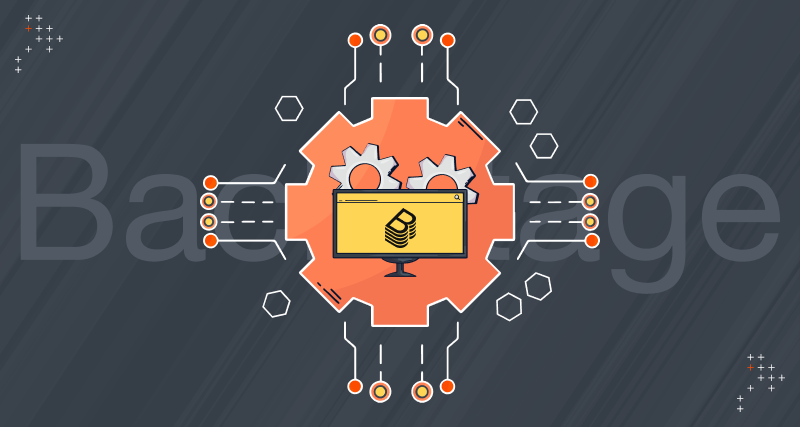Many organizations struggle with managing their infrastructure, microservices, and developer tools in a cohesive way, leading to inefficiencies and reduced productivity. Teams often face challenges in finding a unified platform that can streamline their workflows while offering customization options to suit their unique needs.
This fragmentation not only hampers productivity but also makes it difficult to maintain compliance with evolving industry standards and best practices. Backstage addresses these issues by providing a customizable developer portal that centralizes tool access, enabling teams to build and manage infrastructure efficiently.
At Axelerant, we love contributing to this ecosystem by developing open-source extensions that enhance the platform. Our commitment to quality and collaboration drives us to do so.
How Open-Source Contributions Enhance Developer Productivity
Open-source contributions are key drivers of innovation, collaboration, and scalability. By contributing to projects like Backstage, developers can address complex challenges and build solutions that improve their own productivity while helping the community at large.
These contributions can take many forms: fixing bugs, adding new features, improving developer experience, and ensuring compliance with the project's broader standards.
Developers who contribute to Backstage extensions benefit from hands-on experience working with cutting-edge technology while also honing their skills in writing clean, maintainable, and efficient code.
For example, developers may contribute extensions that streamline workflows for managing services or integrations with other developer tools. This active involvement not only deepens understanding but also strengthens a developer’s portfolio and standing in the community.
Axelerant’s Approach: Continuous Learning And Improvement
Axelerant's approach to contributing Backstage extensions is guided by values of continuous learning and improvement. Our contributions, whether they involve adding new features, fixing bugs, or improving documentation, are informed by an ongoing effort to refine our skills and stay abreast of evolving best practices.
The emphasis on learning helps our team stay agile and adaptable. Open-source contributions, particularly to complex projects like Backstage, expose developers to new technologies and frameworks.
In turn, they gain insights that they can apply across various projects, making them more effective and versatile. This mindset ensures that our contributions are not only impactful today but continue to provide value over time.
Read more: The Inception Of The Contributor Role At Axelerant
The Role Of CI/CD And Automated Testing In Building Extensions
CI/CD plays a critical role in open-source development, ensuring that code contributions are tested, verified, and integrated without introducing issues. Automated testing and continuous integration are essential parts of Backstage’s workflow when building extensions.
To ensure high-quality contributions, we rely on tools like GitHub Actions for running CI/CD pipelines. GitHub Actions allows us to automate everything from running tests and linting to deploying updates, making the development process more efficient.
By integrating these workflows directly into the project, we reduce the likelihood of bugs slipping through the cracks, ensuring that Backstage extensions maintain a high standard of quality.
Adopting Best Practices: One-Issue-Per-Pull-Request For Streamlined Development
The community guidelines emphasize the importance of submitting meaningful, high-quality contributions rather than aiming for participation metrics. We follow the one-issue-per-pull-request strategy, which ensures that each pull request is focused and easier to review. This approach also helps maintainers understand the scope of the changes and prevents unnecessary delays.
Clear problem statements and descriptive documentation also make a significant difference in how effectively developers collaborate on Backstage extensions. By following these practices, developers can ensure that their contributions are well-received and have a lasting impact on the project.
Collaborating Across Organizations For Scalable And Compliant Solutions
Open-source projects like Backstage benefit greatly from collaboration across organizations. By bringing together developers from different teams and backgrounds, the community can build more robust and scalable solutions.
An organization typically contributes to Backstage by focusing on its own needs, such as enhancing the service catalog or integrating external tools. If other organizations share similar needs, collaboration may occur naturally.
Even without direct collaboration, contributions can still be implemented if accepted by maintainers, ultimately improving the project for all developers. Axelerant participates in this organic, need-driven model, contributing solutions that serve both its project goals and the broader open-source community.
The Importance Of Non-Code Contributions In The Backstage Ecosystem
While code contributions are the most visible aspect of open-source development, non-code contributions are equally important. Documentation, event organization, and community engagement all contribute to the success of an open-source project like Backstage.
Writing clear and detailed documentation ensures that developers using the extensions we build can easily understand how they work and how to integrate them into their workflows. This boosts developer productivity by reducing the time spent troubleshooting or learning how to use the extension.
Moreover, non-code contributions help create awareness around Backstage extensions, drawing more developers into the project. This, in turn, strengthens the community and increases the overall value that Backstage provides to the developer ecosystem.
Also read: Enhancing Developer Experience Through Effective Documentation
Conclusion
Open-source contributions to Backstage extensions have the power to significantly enhance developer productivity and compliance. By embracing continuous learning, prioritizing automated testing and CI/CD, and making meaningful contributions to the community, we can ensure that Backstage remains a valuable tool for developers worldwide.
At Axelerant, we’re committed to this mission, building solutions that benefit not only our projects but the open-source ecosystem as a whole. Through collaboration and dedication to quality, we aim to make a lasting impact on the developer community.
Schedule a call with our DevEx experts to learn more about our approaches to open-source contributions.

Hussain Abbas, Director of Developer Experience Services
Hussain is a calm ambivert who'll surprise you with his sense of humor (and sublime cooking skills). Our resident sci-fi and fantasy fanatic.

Hanush Kumar, Marketing Associate
Hanush finds joy in YouTube content on automobiles and smartphones, prefers watching thrillers, and enjoys movie directors' interviews where they give out book recommendations. His essential life values? Positivity, continuous learning, self-respect, and integrity.

 We respect your privacy. Your information is safe.
We respect your privacy. Your information is safe.



Leave us a comment